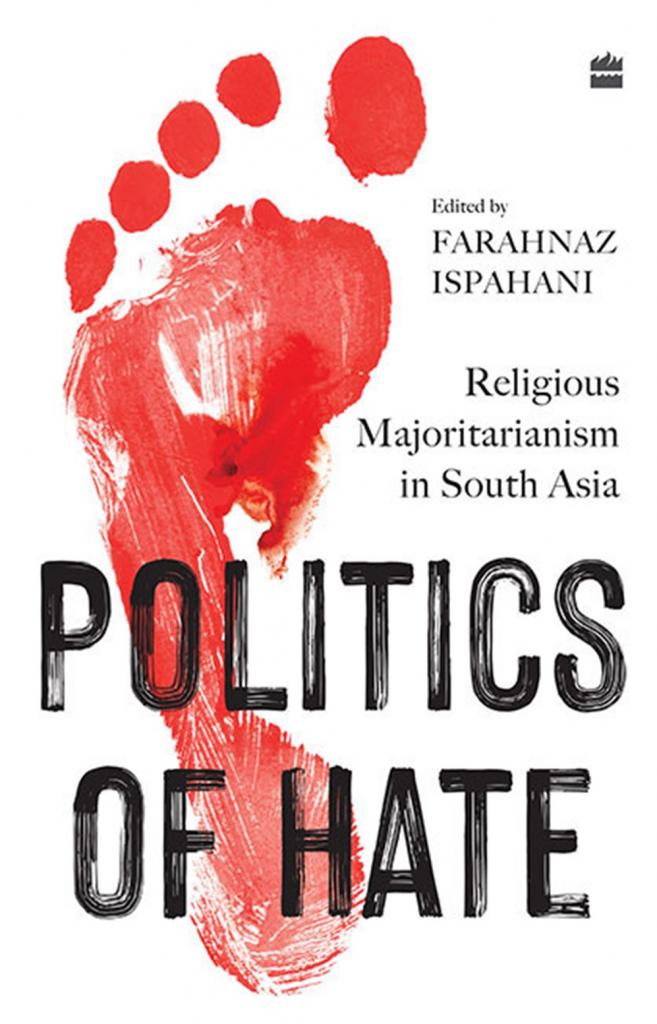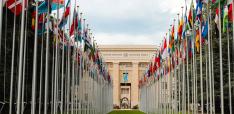Book Review - Politics of Hate: Religious Majoritarianism in South Asia

Politics of Hate: Religious Majoritarianism in South Asia edited by Farahnaz Ispahani. HarperCollins India 2023. 336 pp., £17.99 paperback 9789356293557, $14.99 e-book 9789356290013
The history of the Indian subcontinent is as vast as the region's size and population. Consequently, foreign policy practitioners and activists from outside the region find it challenging to gain a deep understanding of current events, something more than superficial headlines. Moreover, with religious grievances an underlying current in regional affairs, appreciating historic currents that flow into contemporary human rights abuses for religious minorities is crucial but time-consuming. For these reasons, the Politics of Hate (Harper Collins India), an edited book by Farahnaz Ispahani, is a must-read for policymakers and human rights advocates.
Analyzing India, Sri Lanka, Pakistan, and Bangladesh, the Politics of Hate discusses the various challenges facing religious and ethnic minorities in these countries. Reductive often describes popular understandings of these nations – India is Hindu, Sri Lanka is Buddhist, Pakistan and Bangladesh are Muslim – papering over the immense diversity in each country. But internal forces in each are pressing for majority rule, if not domination, which has and will victimize minorities. As Ispahani cites in her introduction, "The last decade or more has seen a rise in majoritarian communalism across large parts of the world. The situation is particularly grim in South Asia, home to almost 2 billion people, which includes followers of every major and minor religious belief in the world." The book is a testament to how South Asia's diversity is under pressure from extremists, terrorists, and, at times, the governments themselves. She concludes, "the rise in religious extremism in this religiously diverse subcontinent is often a function of politics" – the politics of hate.
 The book begins with an overview by former Pakistani ambassador to the United States, Husain Haqqani, who focuses on a reoccurring theme of religious majoritarianism. He states, "Majoritarianism plays on otherization of the minority, but, if history is any guide, seldom enhances stability or peace in a society." (p. 2) This theme repeats throughout the book, not from editorial laxity, but because the countries of South Asia are democratic (albeit imperfectly, and some are weakening). Thus, unlike authoritarian governments in Central Asia or the Middle East, elections matter, and voters can see their views pursued by officials they elect. However, democracy absent minority protections creates dangerous opportunities for manipulative politicians and religious demagogues with expansive agendas to transform their beliefs into law.
The book begins with an overview by former Pakistani ambassador to the United States, Husain Haqqani, who focuses on a reoccurring theme of religious majoritarianism. He states, "Majoritarianism plays on otherization of the minority, but, if history is any guide, seldom enhances stability or peace in a society." (p. 2) This theme repeats throughout the book, not from editorial laxity, but because the countries of South Asia are democratic (albeit imperfectly, and some are weakening). Thus, unlike authoritarian governments in Central Asia or the Middle East, elections matter, and voters can see their views pursued by officials they elect. However, democracy absent minority protections creates dangerous opportunities for manipulative politicians and religious demagogues with expansive agendas to transform their beliefs into law.
India, the largest democracy in the world, is experiencing such a transformation, with the electoral success of Narendra Modi’s BJP and its Hindutva agenda. Chapters two through four examine how Hindu majoritarianism is unravelling the secular foundations laid by India's founding fathers, with dire consequences for Christians and Muslims, while another examines the role of Indian media in fuelling communal violence. The chapter on "Muslimophobia" provides suggested remedies for the government, and Indian Hindus, as well as for Indian Muslims. Chapters five and six on Sri Lanka follow similar themes of illiberal democracy used as a weapon against minorities. The authors explain the siege mentality of Sinhalese Buddhists, how politicians use dog whistles for votes, and the vicious cycle of Muslim discrimination based on fears of terrorism, driving some into the hands of terrorists.
Pakistan also centers largely in the Politics of Hate. Chapters seven through nine on Pakistan examine the plight of Pakistani Christians and Shia Muslims under a legal framework that represses minorities and Muslims who challenge the theology of radicals. Christians on the sub-continent trace their community back to Saint Thomas, one of the Apostles of Christ, and their troubles have continued throughout their history. Of particular insight is chapter eight on how Shia Muslims, from which Pakistan's founder Muhammad Ali Jinnah hailed, navigated the politics of South Asian Islam dominated by conservative Sunni preachers during the quest for independence. Each chapter highlights little-known histories of both communities and how they have maneuvered to survive. Finally, the last two chapters of the book focus on Bangladesh. They are framed by its birth as East Pakistan and the bloody struggle for independence. The depredations from the war continue to reverberate throughout Bangladeshi politics to this day in ways that lessen space for diversity of thought and religious minorities.
The expert contributions in Politics of Hate read well, and the book is of accessible length at 313 pages. However, having followed the region for decades, I would have appreciated discussion on the neighboring countries of Afghanistan, Burma, and Nepal. For understandable reasons of accessibility and readability, Ispahani focused on the countries emerging from the former British Raj, the colonial empire from 1858 to 1947 that dominated the sub-continent. The painful process of partition still lingers between India and Pakistan, and later Bangladesh’s traumatic birth, with continuing consequences today for diversity. However, British tendrils certainly extended further, leaving an indelible legal and cultural mark that reverberates today in Afghanistan and Burma. Nepal, while never colonized was a British protectorate, and the nation also struggles with the politics of hate, as Hindu chauvinists compete against liberals and communists. Unpacking the similarities and differences between these three additional countries would have rounded out the discussions. But perhaps this is best left for volume two.
Overall, Politics of Hate should be on the bookshelf of policymakers and activists focusing on South Asia. While those concentrating on human rights, religious freedom, and protecting minorities will find it of immense value, practitioners working on more prominent issues should also consider the book's many insights. The most vexing challenges within and between these countries involve religious minority rights and histories of persecution. In addition, radicals and terrorists against a westernizing agenda use narratives of xenophobia and religious exclusivism to justify violence and promote politicians supporting their worldview. With two billion people in South Asia, the region and these issues are too important to ignore.
Knox Thames served in a special envoy role at the U.S. Department of State during the Obama and Trump administrations, focused on religious minorities in the Middle East and South / Central Asia. He is currently a Senior Fellow at Pepperdine University. Follow him on Twitter at KnoxThames.


